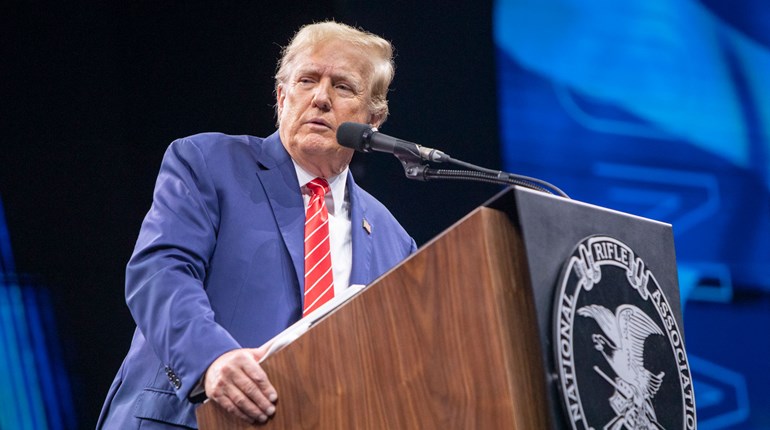
If a number of politicians who are hostile to the Second Amendment get their way, American banks will essentially begin spying on American citizens who buy guns and/or ammunition. And if those citizens are buying what the politicians consider to be too much ammunition or too many firearms, those very citizens could be labeled potential domestic terrorists.
Recently, U.S. Sen. Ed Markey (D-Mass.) and U.S. Rep. Madeleine Dean (D-Pa.) introduced companion bills titled “Gun Violence Prevention Through Financial Intelligence Act.”
The bills state:
“(1) IN GENERAL.— Not later than 1 year after the date of enactment of this Act, FinCEN shall request information from financial institutions for the purpose of developing an advisory about the identification and reporting of suspicious activity relating to—
(A) how homegrown violent extremists and perpetrators of domestic terrorism procure firearms and firearm accessories for the purpose of carrying out lone actor or lone wolf acts of terror within the United States; and
(B) the ways in which the firearms market in the United States is exploited to facilitate gun violence in the United States.”
“FinCEN” refers to Financial Crimes Enforcement Network, a bureau within the U.S. Treasury Department. According to the bureau’s website, “FinCEN’s mission is to safeguard the financial system from illicit use and combat money laundering and promote national security through the collection, analysis, and dissemination of financial intelligence and strategic use of financial authorities.” Much of the bureau’s focus is “to combat money laundering and terrorism financing.”
According to a press release from Markey’s office, bill proponents cited the terrorist who murdered people at the Pulse Nightclub in Orlando, Fla., and the murderer who killed people in a movie theater in Aurora, Colo. The implication is, if this bill were law, banks and credit card companies could have spotted these purchases and informed authorities.
They also argue, “Under existing regulations, financial institutions are required to file Suspicious Activity Reports (SARs) to raise red flags about money laundering, human trafficking, terrorist financing and other criminal activity. The lawmakers’ legislation would require FinCEN to collect and analyze data from financial institutions to determine what indicators, if any, might precede a mass shooting or terrorist attack. FinCEN would then be required to issue an advisory on how financial institutions should use these indicators to comply with regulations.”
“We cannot allow banks and financial institutions to turn a blind eye as shooters bank a pile of guns and ammunition in a lead up to an attack,” said Sen. Markey in the press release. “The Gun Violence Prevention Through Financial Intelligence Act will give us the guidance on how these institutions can help pinpoint and prevent gun violence across the country.”
The bill doesn’t define what might constitute “suspicious activity.” It appears that lawmakers would have to craft such guidance for FinCen, likely the same lawmakers who are proposing this misguided legislation.
For example, would a gun collector who sees a great opportunity and so purchases a dozen guns from an estate be considered suspicious and, as such, be treated as if he or she is a terrorist? Or consider the person who competes in handgun matches and comes upon a batch of 9 mm ammunition being offered at a sale price. The competitor decides to buy up several thousand rounds for practice. Would he or she qualify as a “homegrown violent extremist” and be subjected to an investigation by law enforcement?
All Americans are concerned about terrorism, but wouldn’t such a law bury authorities in false leads as they investigate law-abiding Americans? Isn’t such an invasion of privacy based on biased views of American gun owners a form of harassment?
“Licensed [firearms] retailers cooperate with law enforcement all the time and report suspicious activity,” noted Larry Keane, vice president of the National Shooting Sports Foundation (NSSF), in an article on this proposed legislation.
“However,” Keane added, “this bill is similar to the federal government snooping around libraries and bookstores to see what books people are reading and what websites are visited. It is a deeply troubling intrusion into the civil liberties of gun owners and the exercise of their Second Amendment rights that should trouble all Americans. This legislation should be recognized for what it is – another attempt by lawmakers to circumvent civil rights and co-opting financial institutions to advance an anti-gun agenda.”
This is not the first time such a bill has been introduced. Rep. Jennifer Wexton (D-Va.), along with Rep. Dean, introduced a similar bill in the last Congress, H.R. 5132, also titled the “Gun Violence Prevention Through Financial Intelligence Act.” During a town hall meeting, Rep. Wexton explained to voters that her bill was part of an attempt to explore “whether credit card transactions could be used as a warning tool for mass shootings.”
That bill gained no traction. Hopefully, the same will be said for this latest attempt to turn our banking system into an anti-Second Amendment spy network.


































